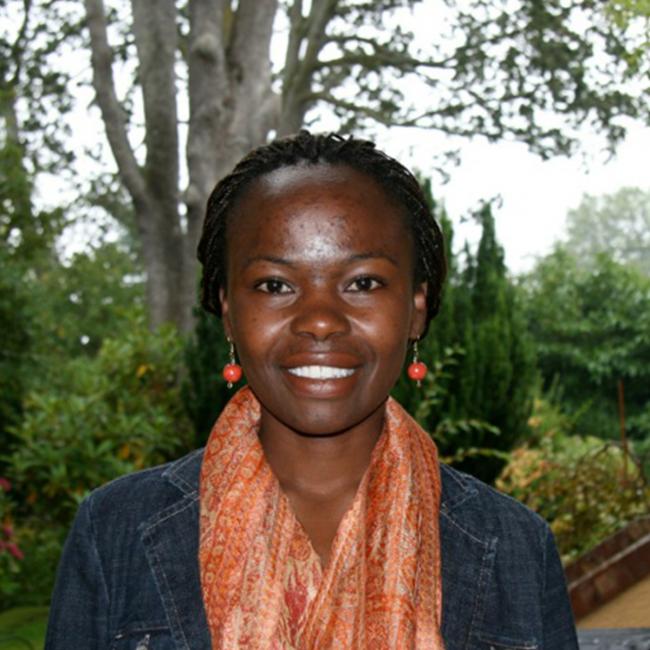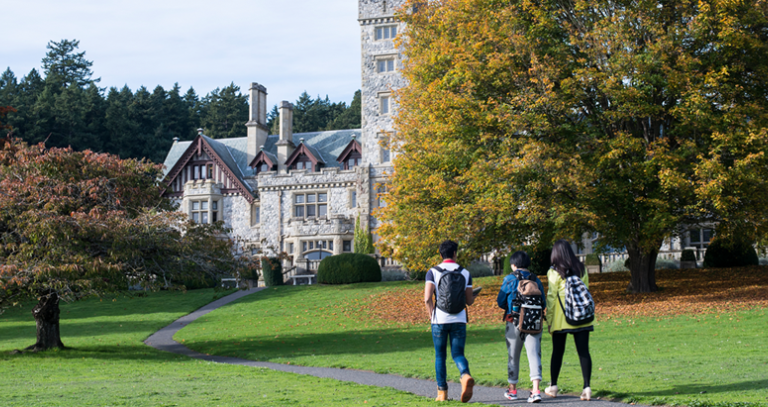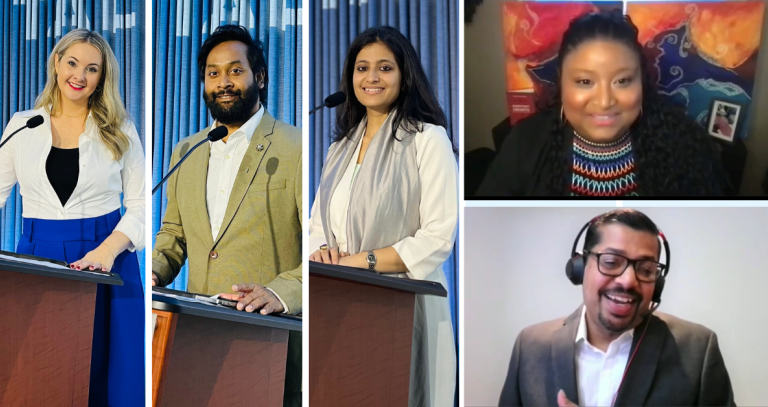Program description
The Master of Arts in Human Security and Peacebuilding is a two-year, interdisciplinary graduate program.
You see peacebuilding as a broad concept — one that transforms societies through short-term development initiatives that become long-term, sustainable peace processes.
Globally, there’s growing demand for leadership in this field. Join professionals working in humanitarian aid, social reconstruction, conflict management and peacebuilding.
This masters level program is designed for working professionals and university graduates aspiring to work in human security and peacebuilding. You'll further your understanding of the complex relationships between economic, political and social development and human security.
It's also for those who want to advance their professional practice in conflict-related and post-conflict contexts. To do so, it provides you with theoretical and practical skills to help restore peace and civil society
Once you have completed this program, you'll be able to work in complex conflict/humanitarian scenarios, use conflict resolution mechanisms to develop peaceful solutions, and communicate effectively to exert strong leadership and empathy in humanitarian crises.
These skills will allow you to work in humanitarian fields, international and domestic non-governmental organizations, and police and military organizations.
Program delivery
This program is delivered through a blend of online courses and on-campus residencies.
Online courses
Online courses consist of assigned readings, synchronous or asynchronous lectures, interactive discussions, and individual and team assignments.
You’re expected to meet deadlines and contribute meaningfully to your class. Your contributions are a big part of everyone’s learning.
In the Master of Arts in Human Security and Peacebuilding program, you’ll start with one online course for a period of nine weeks. You'll then take two more nine-week online courses that have an on-campus residency in their fifth week.
The rest of your courses will be fully online. Each online course requires approximately 20 hours of work per week.
Residencies
This blended program has two two-week residencies. The first one occurs in month four of the program.
In the second year, there is another two-week residency that occurs in month 15 of the program.
Residencies are intensive and immersive. Many students say this time together is the highlight of their program.
During your residency, you can expect to:
- attend classes full time (e.g., Monday to Friday from 8 a.m. to 5 p.m.)
- complete homework and individual and team assignments outside of class hours
- take part in extracurricular activities
Completion options
During the first year of study, students in the MA in Human Security and Peacebuilding take the same set of online courses as students in the related Graduate Diploma in Human Security and Peacebuilding. During the second year of your Master's level studies, you can select from the following options:
Thesis
If you choose to write a thesis, you'll be required to take a second research course during your second residency.
Coursework
If you choose to complete your degree through coursework, you'll be able to continue your studies online during the second year, choosing electives from any of the four Humanitarian Studies graduate programs.
Coursework with internship
If you choose the coursework option, you may also take a 6-credit internship, which gives you field experience. You'll also document the experience of applying your knowledge in the field.
Courses
NOTE: School of Humanitarian Studies students are required to complete all courses in sequence. Exceptions require Program Head approval. With the exception of HUMS 551 and 691, all other HUMS courses may have students from MA Conflict and Management, MA Disaster and Emergency Management, MA Human Security and Peacebuilding, MA Justice Studies and MA Interdisciplinary Studies programs co-registered in the same course.
To see order and date of courses, please refer to the program schedule found under overview tab.
Course-based Track - Required Courses
ITAI
Introduction to Academic Integrity
0.0 Credits
Online
HSPB500
Foundations of Human Security and Peacebuilding
3.0 Credits
Online
HSPB600
Development and Human Security
3.0 Credits
Blended
HSPB530
International Law and Global Institutions
3.0 Credits
Blended
HUMS551
Foundations of Research
3.0 Credits
Online
HSPB515
Social Policy Issues: Social and Economic Insecurity
3.0 Credits
Online
HSPB540
Conflict in the Post-Cold War Era
3.0 Credits
Online
HSPB525
The Politics of Governance and Human Security
3.0 Credits
Blended
HSPB615
Capacity Building: Applied Field Skills, Strategies and Processes
3.0 Credits
Blended
HUMS691
Short Paper
3.0 Credits
Online
Course-based with Internship Track - Required
Take all the same courses as the Course-based track PLUS the following
HUMSIP
Internship Preparation and Career Management Skills
0.0 Credits
Online
HUMS644
Internship
6.0 Credits
Directed, Field, Lab or Major Project, Online
Course-based Tracks - Electives
- Student's choose THREE electives if they are on the Course-based Track.
- Student's choose ONE elective if they are on the Course-based with Internship Track.
Courses are broken into three time periods. To see what courses you can choose for each time period please refer to the program schedule found under overview tab.
HUMS641
Foundations of Policy and Practice in Humanitarian Action
3.0 Credits
Online
HUMS643
Ethno-political Conflicts in the Canadian Context
3.0 Credits
Online
HUMS661
Risk and Crisis Communication
3.0 Credits
Online
HUMS671
Transdisciplinarity in Practice
3.0 Credits
Online
HUMS611
Intercultural Competence
3.0 Credits
Online
HUMS651
Case Studies in Humanitarian Action: Advanced Policy and Practice
3.0 Credits
Online
HUMS652
Adaptive Management for Complex Humanitarian Problems in the 21st Century
3.0 Credits
Online
HUMS672
Public Images of Justice and Fairness
3.0 Credits
Online
HUMS642
Psychosocial Interventions: Managing Stress, Trauma, and Loss
3.0 Credits
Online
HUMS653
Environmental and Resource-Based Conflict Management
3.0 Credits
Online
HUMS662
Professional Practice in Conflict and Change Management
3.0 Credits
Blended
HUMS673
Indigenous Perspectives on Humanitarianism
3.0 Credits
Online
CPWB500
Foundations: Reframing Child Wellbeing in Complex Global Realities
3.0 Credits
Online
PJMN501
Managing Complex Projects
3.0 Credits
On Campus, Online
Thesis Track - Required Courses
ITAI
Introduction to Academic Integrity
0.0 Credits
Online
HSPB500
Foundations of Human Security and Peacebuilding
3.0 Credits
Online
HSPB600
Development and Human Security
3.0 Credits
Blended
HSPB530
International Law and Global Institutions
3.0 Credits
Blended
HUMS551
Foundations of Research
3.0 Credits
Online
HSPB515
Social Policy Issues: Social and Economic Insecurity
3.0 Credits
Online
HSPB540
Conflict in the Post-Cold War Era
3.0 Credits
Online
HSPB525
The Politics of Governance and Human Security
3.0 Credits
Blended
HUMS630
Advanced Research Methods
3.0 Credits
Blended, Online
HUMS695
Thesis
12.0 Credits
Directed, Field, Lab or Major Project
Faculty
Transfer agreements
Refine results
Standard admission
- Four-year (or comparable) undergraduate degree in a relevant and related field*, with a minimum GPA of 'B+' (3.33/4.33), from a recognized post-secondary institution
* Relevant and related fields are defined by each program based on disciplinary and/or professional practices. Applicants are required to address how they consider their academic education to be relevant and related to their desired program of study within the personal statement questions.
Flexible admission
- Applicants who meet the degree requirement, but not the GPA requirement, will be required to have a minimum 5 years of relevant* professional experience.
- Applicants without an undergraduate degree will normally require 10 years of work experience, with a minimum of two years of relevant* professional experience in a leadership or management position**, or an equivalent combination of education and experience.
- All flexible admission applicants will be required to complete "Academic Writing and Critical Thinking" several weeks prior to starting the program and obtain a minimum B+ (77%).
* Each program, based on disciplinary and/or professional practices, defines what is considered relevant professional experience. Applicants are required to address how/why they consider their respective supervisory (and overall work experience) to be relevant and related to their desired program of study within the personal statement questions.
** Experience in a leadership or management position is considered on the basis of a holistic review of career progression, which demonstrates increasing competency and/or responsibility. This can include, but is not limited to, supervisory functions, signing responsibilities, contributions to organisational change and/or implementation of organisational vision and mission. Applicants are required to address how they consider their work experience to meet these requirements within the personal statement
English language proficiency
- If English is not your primary language, please review our English language requirements.
All applications to this program require submission of the following information and supporting documents before your file can be assessed for admission:
Application form
In order to apply online, you will be required to create a log-in account using your email address. You will be required to list all credit courses and/or programs you have completed or are currently enrolled in. An application fee will be required. If your application fees are being paid by a third party, review sponsored student information. Once submitted, you may check the status of your application at any time.
Missed your application deadline? While we can’t make any guarantees, we may be able to accommodate late applications if there's still space and enough time to process. If you're interested in an intake that is now closed to applications, apply for the next available intake and email Admissions with your preferred start date. Make sure you’re prepared to submit your program's required documents right away. We can't make an admissions decision without them.
Official transcripts
Applicants are responsible for arranging for the submission of official transcripts from ALL post-secondary (higher education) institutions currently or previously attended, for all credit courses and/or programs. Transcripts are not required for non-credit programs or courses, though some programs may require proof of professional certifications or designations.
Transcripts are considered official only if submitted directly by the Registrar or other recognized authority of the providing institution in the institution's original, sealed envelope. If the envelope has been opened, the transcripts are no longer official and new (official) transcripts will be required to complete your application.
All international transcripts or credentials are subject to an international transcript and/or credential evaluation.
Personal statement
The statement's purpose is to assess applicants' writing skills, as well as their interest and ability to complete the program. Your personal statement should be written as a three to four page narrative and must address each of the following questions using each question as a separate heading:
- Why do you wish to enroll in the human security and peacebuilding program?
- What academic courses and/or training have you done in the area of human security and peacebuilding?
- What work experience have you had in the area of human security and peacebuilding?
- What overseas experience do you bring to the program?
- How is this program relevant to your career goals?
- What experience have you had with distance education and self-directed study?
- What special strengths do you bring to the program?
Letters of Reference
Two letters of reference are required and may be provided by current or past employer(s) or by those who have known the applicant in an academic or volunteer setting.
The references must attest to the applicant's suitability to this program, and particularly the applicant's ability to complete a demanding graduate program, including graduate level writing and research. The writer should indicate the length of time and context in which they have known the applicant, and should also consider the ability of the applicant to model appropriate behavior in the field as well as the personal attributes of the applicant.
In the case of an employer's reference, the letter should also attest to the applicant's performance in the context of current or previous employment. The letter should address such areas as work in the field of human security and peacebuilding as well as leadership potential.
Structured résumé
Applicant's résumé must include the following:
- Post-secondary education: List all post-secondary education, degrees, diplomas, and certificates you have achieved.
- Training and professional development in the area of human security and peacebuilding: List career related training and professional development programs completed within the past five years. Include the source of training, and the duration and year completed. List other training and personal development programs not already identified.
- Voluntary/unpaid work experience: List and describe any voluntary/unpaid post-secondary employment and/or community service experience. Please include name of organization, length of service and a brief description of duties. Highlight experience related to human security and peacebuilding.
- Full-time work experience: Please include name of organization, position, length of service and brief description of duties. Highlight experience related to human security and peacebuilding.
- Professional memberships/affiliations: List memberships and positions you hold/have held in professional associations, service clubs, community/volunteer sector.
- Other relevant information: Provide any other information which you believe is relevant to your application and will be of assistance to the review committee.
If applicable:
- Applicants declaring permanent resident or Convention Refugee status in Canada, must submit a copy of their Permanent Resident Card (PR card) along with their application.
- Transcript evaluation fee or credential evaluation report, if submitting international transcripts.
- An official English language proficiency score report or other evidence of proficiency if English is not your primary language.
- Other information or documents as may be requested to determine your eligibility.
For information on how and where to send your supporting documents, please refer to the document submission guidelines.



